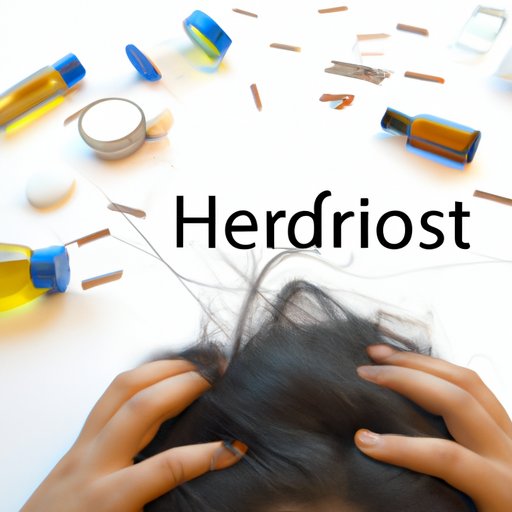Introduction
Hair loss can be an embarrassing and distressing experience. It can have a significant impact on self-esteem and confidence, and it can be difficult to know what to do in order to reduce the effects of hair loss. In this article, we will explore the common causes of hair loss and provide recommendations for reducing their effects.
Hormonal Imbalances
Hormonal imbalances can lead to hair loss. The hormones most commonly associated with hair loss are dihydrotestosterone (DHT) and testosterone. DHT is a hormone that binds to receptors on the scalp, and it can cause hair follicles to shrink, leading to hair thinning and eventually hair loss. Testosterone can also bind to receptors on the scalp, leading to a decrease in the number of healthy hair follicles.
The most effective way to reduce the effects of hormonal imbalances is to address the underlying cause. For example, if the hormonal imbalance is due to birth control pills, then switching to a different type of birth control may help. Other treatments such as topical minoxidil or oral finasteride may also be helpful in reducing the effects of hormonal imbalances.
Hereditary Factors
Hereditary factors can also play a role in hair loss. Certain genes have been linked to hair loss, including those responsible for male pattern baldness, female pattern baldness, and alopecia areata. These conditions may be inherited from one’s parents, and they can cause hair follicles to shrink or stop producing hair altogether.
The best way to reduce the effects of hereditary factors is to identify and address any underlying genetic conditions. Treatments such as topical minoxidil, oral finasteride, or laser therapy may be beneficial in slowing down the progression of hair loss. Additionally, lifestyle changes such as reducing stress and improving diet may also help to reduce the effects of hereditary factors.
Stress and Anxiety
Stress and anxiety can also lead to hair loss. When the body is under prolonged stress, it releases hormones such as cortisol and adrenaline which can lead to inflammation of the scalp and damage to the hair follicles. In addition, underlying mental health issues such as depression and anxiety can also contribute to hair loss.
The best way to reduce the effects of stress and anxiety on hair loss is to address the underlying mental health issues. Treatment options such as psychotherapy, medication, and lifestyle changes can all be beneficial in reducing stress levels and improving overall wellbeing. Additionally, taking supplements such as omega-3 fatty acids and biotin may also help to reduce the effects of stress and anxiety on hair loss.
Thyroid Issues
Thyroid issues can lead to hair loss. The thyroid is a gland in the body which produces hormones responsible for regulating metabolism, growth, and development. When the thyroid is not functioning properly, it can cause an imbalance in these hormones which can lead to hair loss.
The most effective way to reduce the effects of thyroid issues on hair loss is to address the underlying condition. Treatment options such as medication and lifestyle changes can help to restore balance to the hormones produced by the thyroid and reduce the effects of hair loss. Additionally, taking supplements such as iodine and selenium may also help to reduce the effects of thyroid issues on hair loss.
Poor Diet
A poor diet can also lead to hair loss. The hair is made up of proteins, and if the body does not receive enough of the essential nutrients required for healthy hair growth, it can lead to hair loss. Nutrients such as iron, zinc, and vitamins A, C, and E are all important for healthy hair growth.
The best way to reduce the effects of a poor diet on hair loss is to make sure that the body is receiving the essential nutrients it needs. Eating a balanced diet with plenty of fruits and vegetables, lean proteins, and whole grains can help to ensure that the body is receiving the nutrients it needs for healthy hair growth. Additionally, taking supplements such as omega-3 fatty acids, iron, and biotin may also help to reduce the effects of a poor diet on hair loss.
Medications
Certain medications can also lead to hair loss. Medications such as chemotherapy drugs, beta blockers, and anticoagulants can all cause hair loss. Additionally, certain medical conditions such as lupus and diabetes can also cause hair loss due to the medications used to treat them.
The best way to reduce the effects of medications on hair loss is to find alternatives to the medications causing the hair loss. For example, if chemotherapy drugs are causing hair loss, then switching to a different type of chemotherapy may help. Additionally, lifestyle changes such as reducing stress and improving diet may also help to reduce the effects of medications on hair loss.
Ageing
Ageing can also lead to hair loss. As we age, the body undergoes many changes which can affect the hair follicles. Hormone levels begin to decline, blood circulation to the scalp decreases, and the scalp becomes more susceptible to damage. All of these changes can lead to hair loss.
The best way to reduce the effects of ageing on hair loss is to focus on maintaining overall health. Eating a balanced diet, exercising regularly, and managing stress levels can all help to reduce the effects of ageing on hair loss. Additionally, taking supplements such as omega-3 fatty acids and biotin may also help to reduce the effects of ageing on hair loss.
Conclusion
Hair loss can be caused by a variety of factors, including hormonal imbalances, hereditary factors, stress and anxiety, thyroid issues, poor diet, medications, and ageing. While there is no single solution to hair loss, there are steps that can be taken to reduce the effects of these common causes. Making lifestyle changes such as reducing stress, improving diet, and taking supplements may help to reduce the effects of hair loss. Additionally, seeking treatment for any underlying conditions may also be beneficial in reducing the effects of hair loss.


